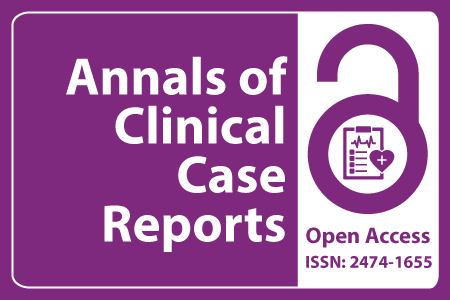
Journal Basic Info
- Impact Factor: 1.809**
- H-Index: 6
- ISSN: 2474-1655
- DOI: 10.25107/2474-1655
Major Scope
- Depression
- Anatomy
- Cardiac Surgery
- Cardiovascular Medicine
- Dentistry and Oral Biology
- Vascular Medicine
- Medical Radiography
- Physical Medicine & Rehabilitation
Abstract
Citation: Ann Clin Case Rep. 2022;7(1):2176.DOI: 10.25107/2474-1655.2176
Pediatric Appropriate Prolonged-Release Melatonin Minitablet for Insomnia in Children and Adolescents with Autism Spectrum Disorder
Schroder C1,2*, Bioulac S3 and Hill CM4
1Department of Child and Adolescent Psychiatry and Excellence Centre for Autism and Neurodevelopmental Disorders STRAS&ND, Strasbourg University Hospitals and University of Strasbourg Medical School, France 2Institute for Cellular and Integrative Neurosciences, CNRS UPR 3212, Sleep Disorders Center and International Research Center for ChronoSomnology, France 3Department of Sleep, Bordeaux University Hospital, University of Bordeaux, France 4Department of Sleep Medicine, School of Clinical Experimental Sciences, University of Southampton, and Southampton Children's Hospital Southampton, UK
*Correspondance to: Schroder C
PDF Full Text Case Series | Open Access
Abstract:
Despite high rates of comorbid insomnia among children and adolescents with Autism Spectrum Disorder (ASD), and its negative impact on child development, health and quality of life, there is limited awareness among clinicians of screening for, and treatment of, insomnia in this population. Prolonged-Release Melatonin (PedPRM, available commercially as Slenyto®) is the first authorized drug for the management of insomnia in children and adolescents with ASD or Smith Magenis Syndrome (SMS) but there is little evidence on how this new medicinal product performs in real life treatment. This case series describes 6 children and adolescents (age 2 to 17 years) with ASD and insomnia and the decision-making process involved in PedPRM selection and treatment optimization. All patients were initially given behavioral and pharmacological products for their insomnia (e.g. iron supplementation, antihistamines, immediate-release melatonin) with no or partial success and subsequently prescribed PedPRM. Following PedPRM dose optimization, all patients attained acceptable sleep maintenance (longest sleep episode >6 h), initiation (sleep onset latency <30 min) and duration (>8 h at age 3 to 5 and >7 h at age 5 to 17 years). Significant positive effects on daytime behavior and parent satisfaction were noted in all cases. Thus, real life evidence supports PedPRM clinical trial outcomes in which PedPRMis effective and safe strategy for managing insomnia in pediatric patients with ASD or SMS.
Keywords:
Melatonin; Pediatric prolonged release sleep; Insomnia; Autism spectrum disorder
Cite the Article:
Schroder C, Bioulac S, Hill CM. Pediatric Appropriate Prolonged- Release Melatonin Minitablet for Insomnia in Children and Adolescents with Autism Spectrum Disorder. Ann Clin Case Rep. 2022; 7: 2176..













